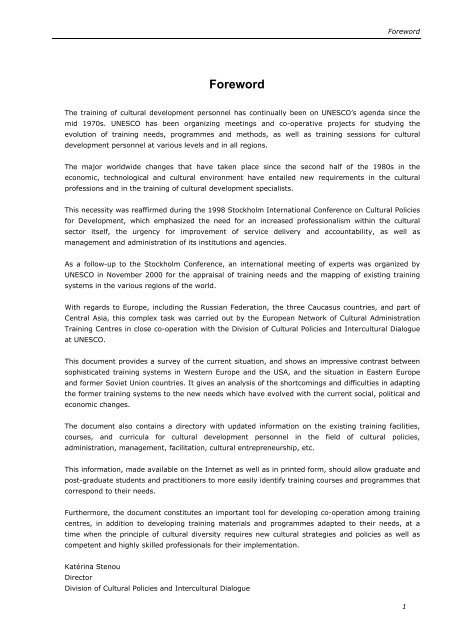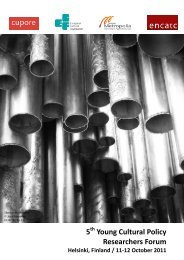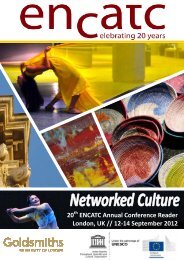Training in cultural policy and management: international ... - Encatc
Training in cultural policy and management: international ... - Encatc
Training in cultural policy and management: international ... - Encatc
Create successful ePaper yourself
Turn your PDF publications into a flip-book with our unique Google optimized e-Paper software.
Foreword<br />
Foreword<br />
The tra<strong>in</strong><strong>in</strong>g of <strong>cultural</strong> development personnel has cont<strong>in</strong>ually been on UNESCO’s agenda s<strong>in</strong>ce the<br />
mid 1970s. UNESCO has been organiz<strong>in</strong>g meet<strong>in</strong>gs <strong>and</strong> co-operative projects for study<strong>in</strong>g the<br />
evolution of tra<strong>in</strong><strong>in</strong>g needs, programmes <strong>and</strong> methods, as well as tra<strong>in</strong><strong>in</strong>g sessions for <strong>cultural</strong><br />
development personnel at various levels <strong>and</strong> <strong>in</strong> all regions.<br />
The major worldwide changes that have taken place s<strong>in</strong>ce the second half of the 1980s <strong>in</strong> the<br />
economic, technological <strong>and</strong> <strong>cultural</strong> environment have entailed new requirements <strong>in</strong> the <strong>cultural</strong><br />
professions <strong>and</strong> <strong>in</strong> the tra<strong>in</strong><strong>in</strong>g of <strong>cultural</strong> development specialists.<br />
This necessity was reaffirmed dur<strong>in</strong>g the 1998 Stockholm International Conference on Cultural Policies<br />
for Development, which emphasized the need for an <strong>in</strong>creased professionalism with<strong>in</strong> the <strong>cultural</strong><br />
sector itself, the urgency for improvement of service delivery <strong>and</strong> accountability, as well as<br />
<strong>management</strong> <strong>and</strong> adm<strong>in</strong>istration of its <strong>in</strong>stitutions <strong>and</strong> agencies.<br />
As a follow-up to the Stockholm Conference, an <strong>in</strong>ternational meet<strong>in</strong>g of experts was organized by<br />
UNESCO <strong>in</strong> November 2000 for the appraisal of tra<strong>in</strong><strong>in</strong>g needs <strong>and</strong> the mapp<strong>in</strong>g of exist<strong>in</strong>g tra<strong>in</strong><strong>in</strong>g<br />
systems <strong>in</strong> the various regions of the world.<br />
With regards to Europe, <strong>in</strong>clud<strong>in</strong>g the Russian Federation, the three Caucasus countries, <strong>and</strong> part of<br />
Central Asia, this complex task was carried out by the European Network of Cultural Adm<strong>in</strong>istration<br />
<strong>Tra<strong>in</strong><strong>in</strong>g</strong> Centres <strong>in</strong> close co-operation with the Division of Cultural Policies <strong>and</strong> Inter<strong>cultural</strong> Dialogue<br />
at UNESCO.<br />
This document provides a survey of the current situation, <strong>and</strong> shows an impressive contrast between<br />
sophisticated tra<strong>in</strong><strong>in</strong>g systems <strong>in</strong> Western Europe <strong>and</strong> the USA, <strong>and</strong> the situation <strong>in</strong> Eastern Europe<br />
<strong>and</strong> former Soviet Union countries. It gives an analysis of the shortcom<strong>in</strong>gs <strong>and</strong> difficulties <strong>in</strong> adapt<strong>in</strong>g<br />
the former tra<strong>in</strong><strong>in</strong>g systems to the new needs which have evolved with the current social, political <strong>and</strong><br />
economic changes.<br />
The document also conta<strong>in</strong>s a directory with updated <strong>in</strong>formation on the exist<strong>in</strong>g tra<strong>in</strong><strong>in</strong>g facilities,<br />
courses, <strong>and</strong> curricula for <strong>cultural</strong> development personnel <strong>in</strong> the field of <strong>cultural</strong> policies,<br />
adm<strong>in</strong>istration, <strong>management</strong>, facilitation, <strong>cultural</strong> entrepreneurship, etc.<br />
This <strong>in</strong>formation, made available on the Internet as well as <strong>in</strong> pr<strong>in</strong>ted form, should allow graduate <strong>and</strong><br />
post-graduate students <strong>and</strong> practitioners to more easily identify tra<strong>in</strong><strong>in</strong>g courses <strong>and</strong> programmes that<br />
correspond to their needs.<br />
Furthermore, the document constitutes an important tool for develop<strong>in</strong>g co-operation among tra<strong>in</strong><strong>in</strong>g<br />
centres, <strong>in</strong> addition to develop<strong>in</strong>g tra<strong>in</strong><strong>in</strong>g materials <strong>and</strong> programmes adapted to their needs, at a<br />
time when the pr<strong>in</strong>ciple of <strong>cultural</strong> diversity requires new <strong>cultural</strong> strategies <strong>and</strong> policies as well as<br />
competent <strong>and</strong> highly skilled professionals for their implementation.<br />
Katér<strong>in</strong>a Stenou<br />
Director<br />
Division of Cultural Policies <strong>and</strong> Inter<strong>cultural</strong> Dialogue<br />
1






